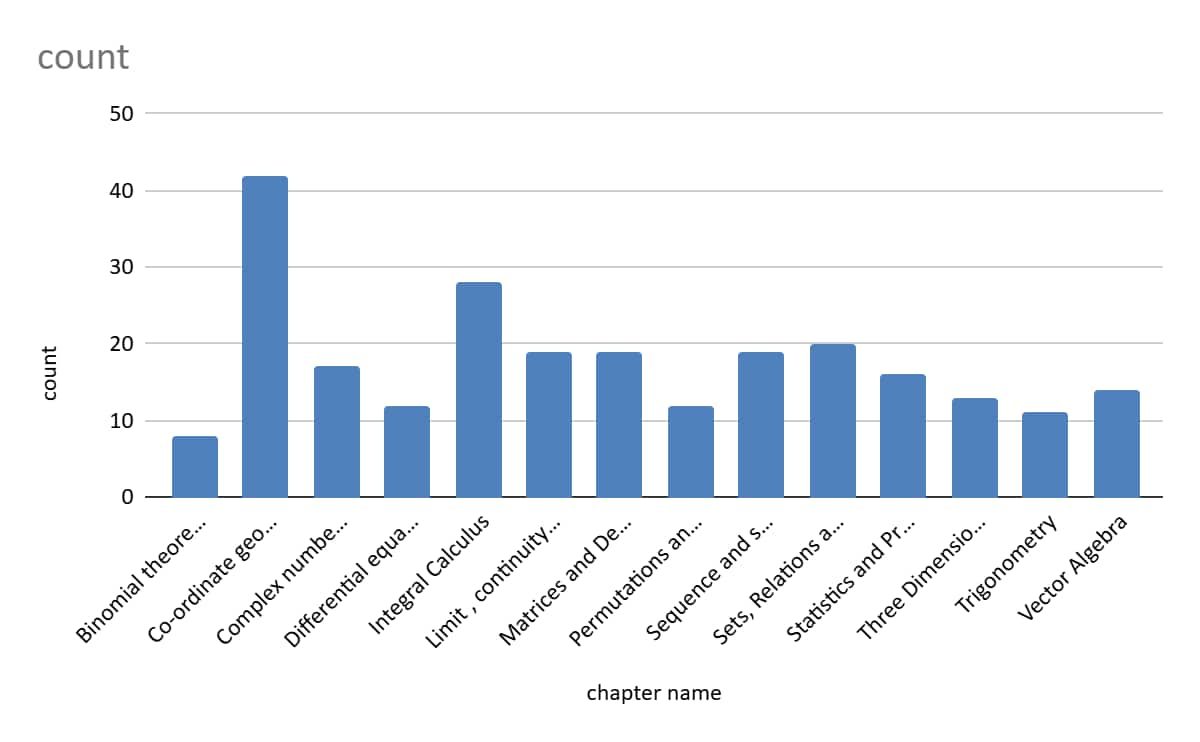Most Scoring Topics in Maths for JEE Mains 2026 - Check Analysis Here
Most Scoring Topics in Maths for JEE Mains 2026 - Are you looking for the most scoring topics in Maths for JEE Mains 2026 preparation? You have come to the right page! In this article we shall dive into the most scoring topics and chapters of Maths for JEE Mains 2026. As you must know, JEE mains is conducted by NTA twice every year with the syllabus covering NCERT thoroughly. The high scoring topics in Maths for JEE Main 2026 often include chapters where formulas directly lead to quick solutions. Toppers often focus on the most important topics instead of focussing on every topic with the same depth. This strategy is used by the students to achieve higher scores in highly competitive exams like JEE Mains. Similarly, there are always some math topics that recur more often each year and provide simpler patterns for solving them. Let’s dive in and get ready for you to ace the exam!
The State Code of Eligibility is determined based on the state where the candidate passed Class 12, not their place of residence. Candidates must ensure correct details to avail home state quota benefits.
This Story also Contains
- High Weightage Chapters for JEE Mains 2026
- Most Scoring Topics in Maths for JEE Mains 2026
- Important Chapters In Maths for JEE Mains 2026- Study Resources

The important chapters in Maths for JEE Mains 2026 usually overlap with concepts tested in both board exams and competitive papers. But before diving into that,let's look at the exam pattern:
Subject | Total Questions | Questions to Attempt | Marks per Question | Total Marks |
Physics | 30 | 25 | 4 | 100 |
Chemistry | 30 | 25 | 4 | 100 |
Mathematics | 30 | 25 | 4 | 100 |
Total | 75 | 75 | – | 300 |
High Weightage Chapters for JEE Mains 2026
Prioritizing the high scoring topics in Maths for JEE Main 2026 can help maximize marks without spending extra time on lengthy derivations. Let’s understand the distribution of chapters through the following bar graph:

You can also have a look at the following table:
Chapter Name | No. of Questions | Weightage |
Co-ordinate geometry | 43 | 19.11% |
Integral Calculus | 23 | 10.22% |
Limit , continuity and differentiability | 23 | 10.22% |
Sets, Relations and Functions | 17 | 7.56% |
Complex numbers and quadratic equations | 16 | 7.11% |
Sequence and series | 16 | 7.11% |
Matrices and Determinants | 15 | 6.67% |
Statistics and Probability | 14 | 6.22% |
Binomial theorem and its simple applications | 12 | 5.33% |
Three Dimensional Geometry | 12 | 5.33% |
Trigonometry | 10 | 4.44% |
Vector Algebra | 9 | 4.00% |
Permutations and combinations | 8 | 3.56% |
Differential equations | 7 | 3.11% |
Grand Total | 225 | 100.00% |
Most Scoring Topics in Maths for JEE Mains 2026
In this table below we will look at the most important chapters that you most prioritize for your 2026 JEE Mains preparation:
Concept Name | Chapter | No. of questions asked in 2025 out of 250 |
Linear Differential Equation | Differential equations | 9 |
Area Bounded by Two Curves | Integral Calculus | 6 |
Centroid | Co-ordinate geometry | 5 |
Cramer’s law | Matrices and Determinants | 5 |
Dispersion (Variance and Standard Deviation) | Statistics and Probability | 5 |
Dot (Scalar) Product in Terms of Components | Vector Algebra | 5 |
Sum of n terms of an AP | Sequence and series | 5 |
Chord of Contact | Co-ordinate geometry | 4 |
Distance between two points | Co-ordinate geometry | 4 |
Equations for a Line in Space | Three Dimensional Geometry | 4 |
Equivalence relation | Sets, Relations and Functions | 4 |
Integration Using Substitution | Integral Calculus | 4 |
Multiplication of two matrices | Matrices and Determinants | 4 |
Newton-Leibnitz's Formula | Integral Calculus | 4 |
Parabola | Co-ordinate geometry | 4 |
Relation Between Roots and Coefficient of Quadratic Equation | Complex numbers and quadratic equations | 4 |
Area Bounded by Curve and Axes | Integral Calculus | 3 |
Area of Triangle | Co-ordinate geometry | 3 |
Arithmetic Progression | Sequence and series | 3 |
General Term of Binomial Expansion | Binomial theorem and its simple applications | 3 |
Important Terminologies and Definitions of Probability | Statistics and Probability | 3 |
Integration by Parts | Integral Calculus | 3 |
Maxima and Minima of a Function | Limit , continuity and differentiability | 3 |
PERMUTATION AS AN ARRANGEMENT | Permutations and combinations | 3 |
For deeper analysis, we have provided a table that helps you understand the distribution better. We assessed each question on a scale from 1 to 3, where 1 represents Easy, 2 represents Moderate, and 3 represents Difficult. The average rating of all questions was found to be 1.43, indicating an overall difficulty level of Easy to Moderate(medium) for the Mathematics subject.The important chapters in Maths for JEE Mains 2026 usually overlap with concepts tested in both board exams and competitive papers.Solving previous papers highlights the high weightage chapters for JEE Mains 2026 that consistently appear in the exam.
Important Chapters In Maths for JEE Mains 2026- Study Resources
Also Read:
Frequently Asked Questions (FAQs)
Chapters like Sequence and Series, Statistics and Probability, Matrices and Determinants, and Binomial Theorem are comparatively easier and can help you score quick marks with less effort.
Ideally, 2–3 hours of focused practice daily is recommended. Divide your time between problem-solving, revising formulas, and taking timed mock tests to simulate exam conditions.
Yes, but only if your conceptual understanding is strong. While focusing on high-weightage chapters helps maximize marks, you should not completely ignore the rest of the syllabus since NTA often includes at least one or two questions from every unit.
You can refer to chapter-wise analysis from previous year papers. Topics like Coordinate Geometry, Calculus, and Algebra have shown maximum representation over multiple sessions. Regularly practicing questions from these areas helps identify recurring question types.
The most scoring chapters include Coordinate Geometry, Integral Calculus, Limits, Continuity and Differentiability, Matrices and Determinants, Complex Numbers, and Probability & Statistics. These chapters consistently appear with high weightage and contain formula-based questions that can be solved quickly.
Popular Courses and Specializations
List of colleges accepting JEE Main
Browse Engineering Colleges by State
Questions related to JEE Main
On Question asked by student community
decent chances actually as home state quota seats are 50%. allotments will depend on the JEE rank and not percentile though. in 2025, for female supernumerary it closed at 9286 rank while for open gen it closed at 5573.
So, would advise to use this tool to check the probable
yes you will. Ususally the return is within 7 days i it has failed at the gateway level which it seems to be. Please wait. You will get the money back
Slim chances as in 2025 the closing rank was 118 for SPA Delhi for B.Arch. You will need to wait for the rank list to come in April before getting a better picture. Please check https://engineering.careers360.com/jee-main-college-predictor for the predictions.
Check out https://engineering.careers360.com/jee-main-rank-predictor to know the probable rank
Hey Abhinav!
You can start your JEE Preparation with ICSE. You can check How to Prepare for JEE Main 2026?- Study Plan and start you preparation.
An 87.12% in JEE is good. To get admission to VIT, you'll need to take the VITEEE. You can apply for VITEEE if you meet the eligibility criteria for class 12. Your JEE score is not required for this process. Admission to VIT will be based on your VITEEE score.
B.Tech/B.Arch Admissions OPEN
Among top 100 Universities Globally in the Times Higher Education (THE) Interdisciplinary Science Rankings 2026
Amrita University B.Tech 2026
ApplyRecognized as Institute of Eminence by Govt. of India | NAAC ‘A++’ Grade | Upto 75% Scholarships
Vignan's Deemed to be University B.Tech Admissions 2026
Apply70th University Ranked by NIRF | 80th Engineering Rank by NIRF | Accredited by NBA and NAAC A+
UPES B.Tech Admissions 2026
ApplyLast Date to Apply: 28th Feb | Ranked #43 among Engineering colleges in India by NIRF | Highest Package 1.3 CR , 100% Placements
MIT World Peace University B.Tech Admissions 2026
ApplyHighest CTC 44.14 LPA | UGC Approved | 1600+ Recruiters | 100% Placement
Manav Rachna-B.Tech Admissions 2026
ApplyNAAC A++ Grade | Recognized as Category-1 Deemed to be University by UGC | 41,000 + Alumni Imprints Globally
